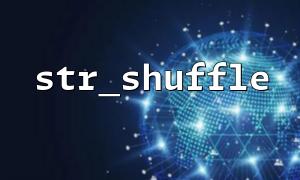In PHP, the str_shuffle() function is a commonly used tool for randomly shuffling characters within a string. It is ideal for applications such as character randomization, password generation, and CAPTCHA systems. But can str_shuffle() properly handle strings that contain special characters? This article explores this question in depth and provides examples to help you understand how the function behaves.
The str_shuffle() function rearranges all the characters in a given string and returns a newly shuffled string. It’s important to note that this function does not modify the original string; it returns a new one.
<span><span><span class="hljs-title function_ invoke__">str_shuffle</span></span><span>(</span><span><span class="hljs-keyword">string</span></span><span> </span><span><span class="hljs-variable">$str</span></span><span>): </span><span><span class="hljs-keyword">string</span></span><span>
</span></span>$str: The string to be shuffled.
<span><span><span class="hljs-meta"><?php</span></span><span>
</span><span><span class="hljs-variable">$string</span></span> = </span><span><span class="hljs-string">"hello"</span></span><span>;
</span><span><span class="hljs-variable">$shuffled</span></span> = </span><span><span class="hljs-title function_ invoke__">str_shuffle</span></span>(</span><span><span class="hljs-variable">$string</span></span>);
</span><span><span class="hljs-keyword">echo</span></span> </span><span><span class="hljs-variable">$shuffled</span></span>;
</span><span><span class="hljs-meta">?></span></span><span>
</span></span>Output:
<span><span>olleh (Output may vary each time)
</span></span>For strings containing special characters, str_shuffle() behaves no differently than it does with regular characters. PHP treats special characters (such as punctuation, spaces, and numbers) just like letters when shuffling. Specifically, str_shuffle() does not apply any extra processing to special characters; it simply treats the entire string as a sequence of characters to shuffle.
<span><span><span class="hljs-meta"><?php</span></span><span>
</span><span><span class="hljs-variable">$string</span></span> = </span><span><span class="hljs-string">"Hello! World#123"</span></span><span>;
</span><span><span class="hljs-variable">$shuffled</span></span> = </span><span><span class="hljs-title function_ invoke__">str_shuffle</span></span>(</span><span><span class="hljs-variable">$string</span></span>);
</span><span><span class="hljs-keyword">echo</span></span> </span><span><span class="hljs-variable">$shuffled</span></span>;
</span><span><span class="hljs-meta">?></span></span><span>
</span></span>Output:
<span><span>Wor1d2! H</span><span><span class="hljs-comment">#l3lo</span></span><span>
</span></span>As shown, special characters (like ! and #) are shuffled normally along with other characters.
Spaces, as special characters, are also shuffled normally. Whether it’s a space or other punctuation, str_shuffle() treats them like any other character.
<span><span><span class="hljs-meta"><?php</span></span><span>
</span><span><span class="hljs-variable">$string</span></span> = </span><span><span class="hljs-string">"Hello World!"</span></span><span>;
</span><span><span class="hljs-variable">$shuffled</span></span> = </span><span><span class="hljs-title function_ invoke__">str_shuffle</span></span>(</span><span><span class="hljs-variable">$string</span></span>);
</span><span><span class="hljs-keyword">echo</span></span> </span><span><span class="hljs-variable">$shuffled</span></span>;
</span><span><span class="hljs-meta">?></span></span><span>
</span></span>Output:
<span><span>r!oWlle oH
</span></span>As shown, spaces are shuffled into random positions, and the structure of the string changes accordingly.
Although str_shuffle() can handle all characters, including special ones, there are a few important considerations:
Security: str_shuffle() should not be used for encryption or generating secure passwords. Its shuffling algorithm is not complex, making the results predictable. For scenarios requiring higher security, such as generating passwords or tokens, use safer functions like random_int() or openssl_random_pseudo_bytes().
Character Set Issues: If the string contains non-ASCII characters (such as Chinese or emoji), str_shuffle() will still shuffle them by character. However, multibyte UTF-8 characters may lead to unexpected behavior, so ensuring correct character encoding is important when processing strings.
<span><span><span class="hljs-meta"><?php</span></span><span>
</span><span><span class="hljs-variable">$string</span></span> = </span><span><span class="hljs-string">"你好,世界!"</span></span><span>;
</span><span><span class="hljs-variable">$shuffled</span></span> = </span><span><span class="hljs-title function_ invoke__">str_shuffle</span></span>(</span><span><span class="hljs-variable">$string</span></span>);
</span><span><span class="hljs-keyword">echo</span></span> </span><span><span class="hljs-variable">$shuffled</span></span>;
</span><span><span class="hljs-meta">?></span></span><span>
</span></span>Output:
<span><span>世你!好,界
</span></span>Although the character order is shuffled, multibyte characters are handled correctly, and PHP treats each as a single character when shuffling.
str_shuffle() can successfully handle strings containing special characters, whether punctuation, spaces, or numbers, shuffling them along with other characters. This makes str_shuffle() a highly flexible and practical string manipulation tool. However, for security-sensitive tasks, it’s better to use stronger random generation methods rather than relying on str_shuffle().
Through this article, you should now have a clearer understanding of using str_shuffle() and how it handles special characters.





